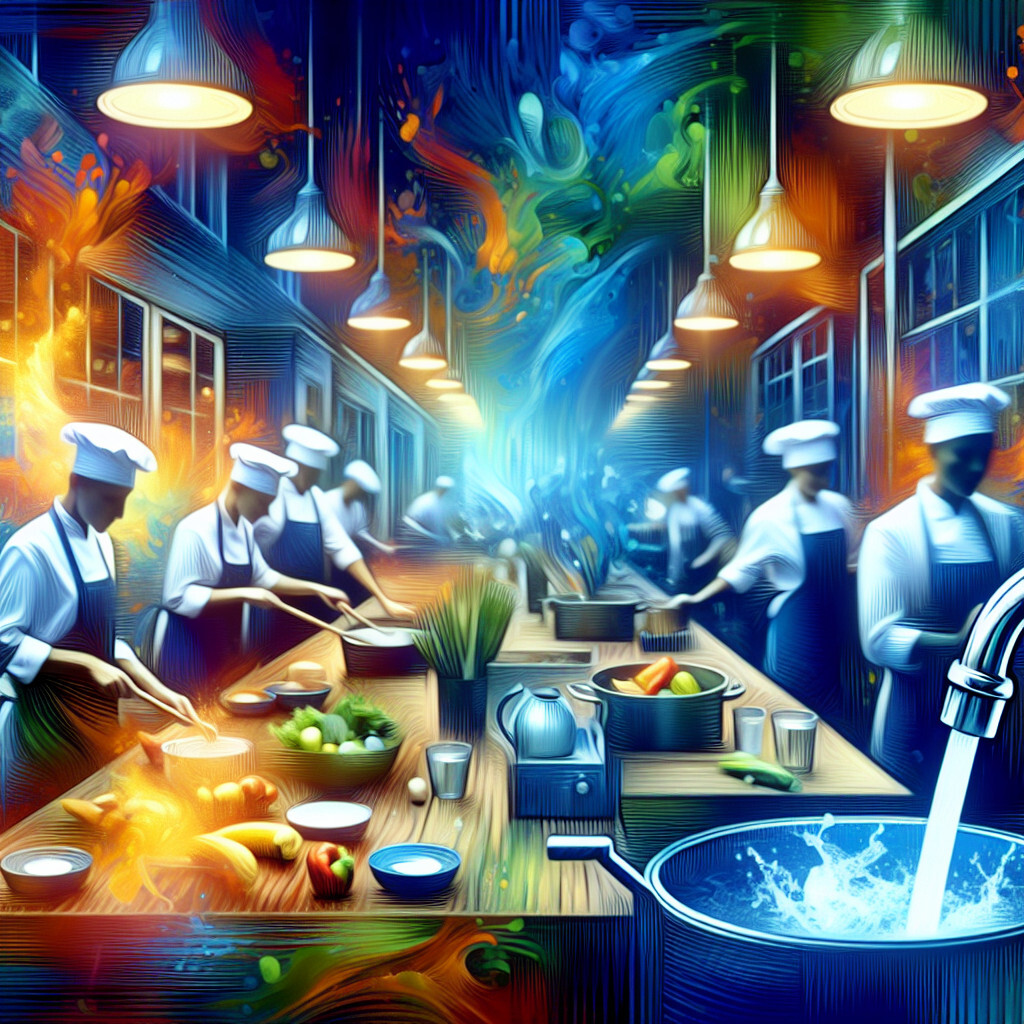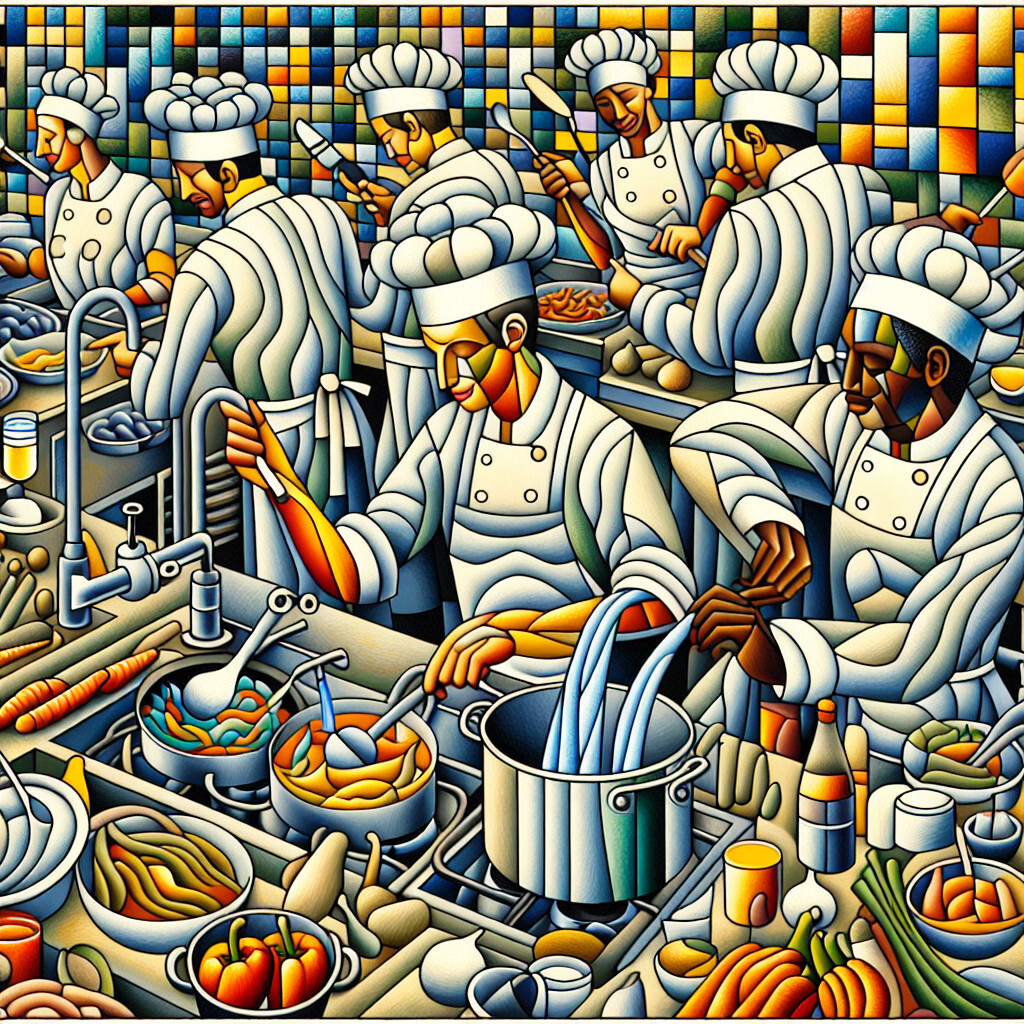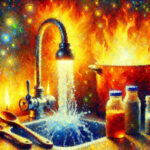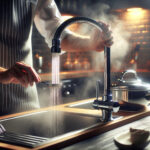-
Table of Contents
“Unlocking Flavors with Every Drop: Tap Water in Restaurant Cooking”
Introduction

Restaurants, like any other food service establishments, utilize water as a crucial ingredient in their cooking processes. This water is often sourced from the local municipal supply, which is essentially tap water. The use of tap water in restaurants is common due to its easy accessibility and cost-effectiveness. It is used in various cooking methods such as boiling, steaming, and as a component in recipes. However, the quality and safety of tap water can vary depending on the location and local water treatment practices. Therefore, some restaurants may choose to filter or purify their tap water before use to ensure it meets their standards for taste and safety.
Understanding the Use of Tap Water in Restaurant Cooking
In the culinary world, the quality of ingredients used in cooking is paramount. This includes not only the freshness of fruits, vegetables, and meats but also the quality of water used in the preparation of meals. One question that often arises in this context is whether restaurants use tap water for cooking. The answer to this question is not as straightforward as it might seem, as it depends on a variety of factors including the location of the restaurant, local water quality, and specific cooking requirements.
In many parts of the world, tap water is perfectly safe for consumption and can be used in cooking without any adverse effects on the taste or safety of the food. In fact, in some regions, tap water undergoes rigorous testing and treatment to ensure it meets high safety standards. In such cases, restaurants often use tap water for cooking, as it is a cost-effective and readily available resource.
However, the use of tap water in restaurant cooking is not a universal practice. In areas where the quality of tap water is questionable, restaurants may opt for filtered or bottled water. This is particularly true in regions where tap water may contain harmful bacteria, heavy metals, or other contaminants. Using such water in cooking could not only affect the taste and appearance of the food but could also pose serious health risks. Therefore, in these situations, restaurants take extra precautions to ensure the water used in their kitchens is of the highest quality.
Moreover, the specific requirements of certain recipes may necessitate the use of filtered or bottled water. For instance, some baking recipes call for water with a specific mineral content, which may not be achievable with tap water. Similarly, certain delicate dishes may require water that is free from any potential taste-altering elements that could be present in tap water. In such cases, even if the local tap water is safe for consumption, restaurants may choose to use filtered or bottled water to ensure the best possible outcome for their dishes.
It’s also worth noting that many restaurants have installed advanced water filtration systems in their kitchens. These systems can remove potential contaminants from tap water, making it safe for use in cooking. This allows restaurants to benefit from the convenience and cost-effectiveness of using tap water, while also ensuring the water meets their specific quality standards.
In conclusion, while many restaurants do use tap water for cooking, this practice is not universal. The decision to use tap water, filtered water, or bottled water in restaurant cooking depends on a variety of factors, including local water quality and the specific requirements of the dishes being prepared. As consumers, it’s always a good idea to inquire about the practices of the restaurants we patronize, not only for our peace of mind but also to make informed choices about the food we consume. After all, the quality of the ingredients used in cooking, including water, can have a significant impact on the taste and nutritional value of our meals.
The Role of Tap Water in the Culinary Practices of Restaurants
The role of tap water in the culinary practices of restaurants is a topic that has sparked curiosity among many diners. The question, “Do restaurants use tap water for cooking?” is one that is frequently asked, and the answer is not as straightforward as one might think. The use of tap water in restaurants is a practice that varies widely, depending on a range of factors including the type of cuisine, the specific dish being prepared, and the quality of the local water supply.
In many cases, tap water is indeed used in restaurant kitchens. This is particularly true for tasks such as boiling pasta, making soups, and washing vegetables. The rationale behind this is that the high temperatures reached during cooking are sufficient to kill any bacteria or other potentially harmful microorganisms that might be present in the water. Moreover, in many developed countries, tap water is subject to stringent quality controls and is perfectly safe for consumption.
However, it is important to note that not all tap water is created equal. The taste and quality of tap water can vary significantly from one location to another, due to differences in the source of the water and the treatment processes it undergoes. For instance, tap water in some areas may have a high mineral content, which can affect the taste of food and beverages. In such cases, restaurants may opt to use filtered or bottled water for cooking, to ensure a consistent flavor profile.
Furthermore, in some culinary traditions, the use of tap water is eschewed in favor of other types of water. For example, in Japanese cuisine, it is common to use soft water, which has a low mineral content, for cooking rice and making tea. This is because soft water is believed to bring out the delicate flavors of these foods more effectively than hard water. Similarly, in the preparation of certain delicate sauces and desserts, chefs may prefer to use bottled water to achieve the desired taste and texture.
In addition to taste considerations, there are also health and safety factors that can influence the use of tap water in restaurants. In regions where the quality of tap water is questionable, restaurants may choose to use bottled or filtered water for all their cooking needs, to minimize the risk of foodborne illness. This is particularly true in developing countries, where waterborne diseases are a major public health concern.
In conclusion, while tap water is commonly used in restaurant kitchens, its use is not universal. The decision to use tap water, filtered water, or bottled water for cooking is a complex one, influenced by a variety of factors including taste, health and safety considerations, and culinary tradition. As a diner, if you have concerns about the use of tap water in the preparation of your food, do not hesitate to ask the restaurant staff. They should be able to provide you with information about their water sources and cooking practices.
Exploring the Health Implications of Using Tap Water in Restaurant Kitchens
In the bustling world of gastronomy, the quality of ingredients is paramount. From the freshest produce to the finest cuts of meat, every element contributes to the overall dining experience. However, one ingredient that often goes unnoticed is water. It is used in virtually every dish, from boiling pasta to making soups and sauces. But do restaurants use tap water for cooking? And if so, what are the health implications?
The answer to the first question is, in most cases, yes. Restaurants, like any other food service establishment, typically use tap water for cooking. This is primarily due to its accessibility and cost-effectiveness. However, the quality of tap water can vary significantly from one location to another, depending on the local water supply and treatment processes.
In many developed countries, tap water undergoes rigorous testing and treatment to ensure it is safe for consumption. This includes the removal of harmful bacteria, viruses, and parasites, as well as the reduction of potentially harmful chemical contaminants. As such, in these regions, the use of tap water in restaurant kitchens is generally considered safe and poses minimal health risks.
However, in areas where the quality of tap water is questionable, the use of such water in cooking can indeed pose health risks. Contaminated water can carry a range of pathogens, including E. coli, Salmonella, and Hepatitis A, which can cause serious illness if ingested. Additionally, long-term exposure to certain chemical contaminants found in water, such as lead or arsenic, can have detrimental effects on health.
Furthermore, even in regions with high-quality tap water, certain factors can still compromise its safety. For instance, old or poorly maintained plumbing systems can introduce harmful substances into the water. Similarly, improper handling or storage of water in the restaurant can lead to contamination.
To mitigate these risks, many restaurants take additional measures to ensure the safety of the water they use for cooking. This may include using filtered or bottled water, particularly for dishes that involve raw or lightly cooked ingredients. Some establishments even go as far as to install advanced water purification systems in their kitchens.
Moreover, restaurants are subject to regular health inspections, which often include checks on water safety. These inspections help to ensure that restaurants are adhering to the necessary safety standards and are providing safe, clean water for cooking.
In conclusion, while restaurants typically use tap water for cooking, the health implications of this practice largely depend on the quality of the local water supply and the safety measures in place at the restaurant. As consumers, it is important to be aware of these factors and to make informed choices about where we choose to dine. After all, the quality of the water used in cooking is just as important as the quality of any other ingredient.
In the end, the use of tap water in restaurant kitchens is a complex issue, with various factors at play. However, with stringent regulations, regular inspections, and the increasing use of water purification technologies, the risks associated with using tap water for cooking can be effectively managed. This ensures that we can continue to enjoy our favorite restaurant meals with peace of mind, knowing that every ingredient, including the water, meets the highest standards of safety and quality.
Tap Water vs. Bottled Water: What Do Restaurants Really Use for Cooking?
When dining out, many people often wonder about the type of water used in the preparation of their meals. The question, “Do restaurants use tap water for cooking?” is a common one, and the answer is not as straightforward as one might think. The choice between tap water and bottled water in restaurant kitchens depends on a variety of factors, including local water quality, restaurant policy, and culinary requirements.
In many parts of the world, tap water is the primary source of water for cooking in restaurants. This is largely due to its easy accessibility and cost-effectiveness. Tap water is typically safe for consumption and cooking purposes, as it undergoes rigorous testing and treatment to meet strict safety standards set by health authorities. Therefore, it is not uncommon for restaurants to use tap water for cooking, especially for tasks like boiling pasta, making soups, or washing vegetables.
However, the use of tap water in restaurants is not universal. In areas where the local tap water may be contaminated or have an unpleasant taste or odor, restaurants often opt for bottled water. Bottled water is also commonly used in high-end restaurants that prioritize the quality and taste of their dishes above all else. This is because the mineral content and pH level of bottled water can subtly influence the taste of food and beverages, making them more appealing to discerning palates.
Moreover, some restaurants may use a combination of both tap and bottled water, depending on the specific needs of their dishes. For instance, tap water might be used for general cooking and cleaning, while bottled water is reserved for dishes and beverages where the quality of water can significantly impact the taste.
It’s also worth noting that many restaurants have installed advanced water filtration systems in their kitchens. These systems purify the tap water, removing any impurities or contaminants, and can even adjust the water’s mineral content and pH level. This allows restaurants to have a consistent water quality, regardless of the local tap water conditions.
In conclusion, the type of water used in restaurant kitchens varies widely and is influenced by a range of factors. While tap water is commonly used due to its accessibility and cost-effectiveness, bottled water or filtered tap water may be used where the quality of water can significantly impact the taste of the food or in areas with poor tap water quality.
As a diner, if you have concerns about the type of water used in the preparation of your meal, do not hesitate to ask the restaurant staff. They should be able to provide you with information about their water source and any filtration systems they may have in place. After all, understanding the ingredients and processes involved in the preparation of your food is an essential part of the dining experience.
Q&A
1. Question: Do restaurants use tap water for cooking?
Answer: Yes, many restaurants use tap water for cooking unless local regulations or health codes require otherwise.
2. Question: Is it safe for restaurants to use tap water for cooking?
Answer: Yes, it is generally safe for restaurants to use tap water for cooking as long as the local water supply is clean and meets health standards.
3. Question: Can the use of tap water affect the taste of food in restaurants?
Answer: Yes, the taste of tap water can vary depending on the location and this can subtly affect the taste of the food.
4. Question: Do restaurants filter their tap water before using it for cooking?
Answer: Some restaurants do use filtration systems to ensure the purity and taste of their water, but it’s not a universal practice.
Conclusion
In conclusion, most restaurants use tap water for cooking due to its easy accessibility and cost-effectiveness, unless the local water supply is not safe or does not meet health standards.






